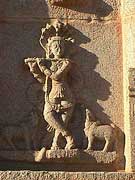India. Birthplace of civilizations, cradle of religions, still home to almost a quarter of the world's people. India has dominated the world stage through most of human history, as the home of mighty empires, as a powerful trading nation, and as a wellspring of culture and civilization. India has always intrigued and fascinated the rest of the world. The fabulous Indies. Rumours of its empires and its wealth brought traders and travelers. Alexander the Great marched across Asia to India. Arab and Jewish traders sailed here. At one time Roman soldiers were barracked here. The ancient Greeks had trading colonies. Columbus wasn't looking for America. He hoped to find a new route to India. European history dramatically favoured nations with an India connection. India excelled in international trade. Five thousand years ago the thriving cities of the Indus Valley traded with Mesopotamia. Indian traders spread their goods and influence through South East Asia. The Hindu island of Bali is one surviving remnant of a great trading empire. Spices, gems, pearls and silks flowed out of India into the rest of the world. Crafts, textiles, and exotic birds and animals were also traded. Hannibal's elephants came from India. So did many of the lavish fabrics craved by Roman nobility. At one point, so much gold was leaving Rome for India that the Roman economy was seriously weakened. India was the 'Japan' of the ancient world, dominating trade relationships. Ideas and culture spread with trade goods. India gifted a numbering system and mathematics to the world. Philosophy, sciences, and medicine reached unrivalled heights, enriching the great scientific achievements of China and the Arab world. The influences of Indian thought can be found in early European culture, and still today, Indian philosophy is influencing modern global cultures.
India excelled in international trade. Five thousand years ago the thriving cities of the Indus Valley traded with Mesopotamia. Indian traders spread their goods and influence through South East Asia. The Hindu island of Bali is one surviving remnant of a great trading empire. Spices, gems, pearls and silks flowed out of India into the rest of the world. Crafts, textiles, and exotic birds and animals were also traded. Hannibal's elephants came from India. So did many of the lavish fabrics craved by Roman nobility. At one point, so much gold was leaving Rome for India that the Roman economy was seriously weakened. India was the 'Japan' of the ancient world, dominating trade relationships. Ideas and culture spread with trade goods. India gifted a numbering system and mathematics to the world. Philosophy, sciences, and medicine reached unrivalled heights, enriching the great scientific achievements of China and the Arab world. The influences of Indian thought can be found in early European culture, and still today, Indian philosophy is influencing modern global cultures.
India has had an epic history. Great empires rose and fell. Colossal armies clashed -hundreds of thousands of soldiers, thousands of elephants and horses, thundering cannons - often at the whims of capricious rulers. Great fortresses and palaces were built and destroyed. War, pestilence, or invaders shattered long periods of prosperity and peace. The colonial era brought new and different challenges to India, culminating in an Independence Movement without parallel, that has left an indelible mark on non-violent struggles for freedom and justice throughout the modern world. During this dramatic history, society in India wove an intricate web of relationships, rituals, and duties, yet remained astonishingly tolerant and diverse. Great religions developed and spread from India. Hindus, Buddhists, Jains, and Sikhs trace their roots from India. India has the second largest Muslim population in the world and is home to Animists, Christians, Zoroastrians, Bah'a'is, Jews, and others. This elaborate history and culture is slowly finding its expression on the World Wide Web. Many of the best sites on India have been built by educational institutions around the world. There are increasing numbers of sites developed in India by Indians, reflecting both the techological skills here and the keen interest in projecting an Indian presence on the Net.
Previous: The History of Wales
Next: Cuba Culture